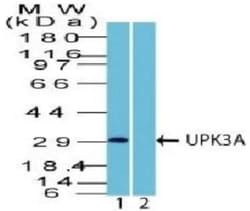Chorionic Gonadotropin beta Chain (hCG beta) Antibody (HCGb/54), Alexa Fluor™ 405, Novus Biologicals™
Manufacturer: Novus Biologicals
Select a Size
| Pack Size | SKU | Availability | Price |
|---|---|---|---|
| Each of 1 | NBP233110W-Each-of-1 | In Stock | ₹ 57,494.00 |
NBP233110W - Each of 1
In Stock
Quantity
1
Base Price: ₹ 57,494.00
GST (18%): ₹ 10,348.92
Total Price: ₹ 67,842.92
Antigen
Chorionic Gonadotropin beta Chain (HCG beta)
Classification
Monoclonal
Conjugate
Alexa Fluor 405
Gene Alias
CGB3choriogonadotropin subunit beta, CGB5, CGB7, CGB8, CG-beta, Chorionic gonadotrophin chain beta, chorionic gonadotropin beta 3 subunit, chorionic gonadotropin beta chain, chorionic gonadotropin beta subunit, chorionic gonadotropin, beta polypeptide, hCGB
Host Species
Mouse
Molecular Weight of Antigen
22 kDa
Quantity
0.1 mL
Research Discipline
Cancer
Gene ID (Entrez)
1082
Target Species
Human
Form
Purified
Applications
Western Blot, ELISA, Immunohistochemistry (Paraffin), Immunohistochemistry (Frozen)
Clone
HCGb/54
Dilution
Western Blot, ELISA, Immunohistochemistry-Paraffin, Immunohistochemistry-Frozen
Gene Symbols
CGB3
Immunogen
Recombinant full-length Chorionic Gonadotropin beta Chain (hCG beta) protein (Uniprot: P01233)
Purification Method
Protein A or G purified
Regulatory Status
RUO
Primary or Secondary
Primary
Test Specificity
This monoclonal antibody reacts with a protein of 22kDa, identified as beta sub-unit of HCG. It does not cross react with the alpha sub-unit. HCG is a glycoprotein, which is secreted in large quantities by normal trophoblasts. It is present only in trace amounts in non-pregnant urine and sera but rises sharply during pregnancy. HCG is composed of two non-identical, non-covalently linked polypeptide chains designated as the subunit is identical to that of thyroid stimulating hormone (TSH) follicle stimulating hormone (FSH), and luteinizing hormone (LH). hCG monoclonal antibody detects cells and tumors of trophoblastic origin such as choriocarcinoma. Large cell carcinoma and adenocarcinoma of the lung demonstrate anti-hCG positivity in 90% and 60% of cases respectively. 20% of lung squamous cell carcinomas are positive. hCG expression by non-trophoblastic tumors may indicate aggressive behavior.
Content And Storage
Store at 4C in the dark.
Isotype
IgG1 κ
Description
- Chorionic Gonadotropin beta Chain (hCG beta) Monoclonal specifically detects Chorionic Gonadotropin beta Chain (hCG beta) in Human samples
- It is validated for Immunohistochemistry, Immunohistochemistry-Paraffin.

